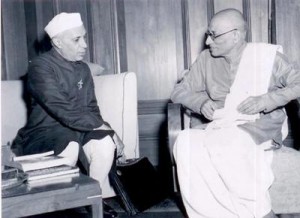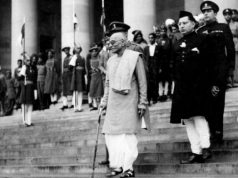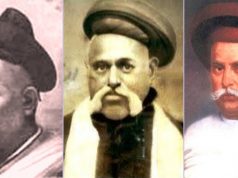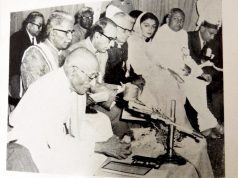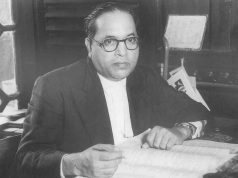This piece was first published in a publication titled ‘Is Socialism Outdated?’ published by the ‘Forum of Free Enterprise.’ What is posted here is a small excerpt from the essay that was first published in 1966.
There is an idea afoot that liberalism came before socialism and therefore must fade out before socialism. I would like to examine that assumption and suggest looking fifty or a hundred years ahead to consider which is the more likely to survive, and which is getting outdated today.
When I went to London as a student, I met a Conservative Member of Parliament, who happened to be a friend of my father’s. He was very nice to me and entertained me to a meal. He casually asked me: ‘Young man, what are your politics?’ I said: ‘Sir, I am an ardent socialist.’ The old Tory patted me on the back and said: ‘Very good, my boy. That is exactly what you should be at your age. You see, if at 21 you are not a socialist, you have no heart. But if at 41 you are still a socialist, it means you have no head!’ It is interesting that by the time I was 41, I wrote a book called Socialism Reconsidered, in which I renounced socialism and declared my liberal and Gandhian faith. I remembered the old Englishman, who had by then died. How right he was!
Now, our great leader, Mahatma Gandhi, used to say that consistency in political affairs is “the virtue of an ass”. He was himself a very inconsistent person, who moved from position to position as he developed and the world developed. The point I am making is that it would be very stupid for anyone to hold on to a point of view or a dogma, disregarding what is happening around him.
Now, Gandhi taught us two things, basically. One was that ends and means are interlinked, that you cannot produce a better society by methods that are not clean and decent, that the end does not justify the means. By the time your means, which are dubious, are practised, your end gets vitiated. In other words, to cite the Soviet Union, by liquidations and butchery, by distortion and lying, yon cannot produce a more fraternal society. You have only to look at the kind of men who have ruled the Soviet Union to realize that this is not a more fraternal society: Stalin. Molotov, Vishinsky, Khrushchov. These are not the embodiments of a more brotherly, free and equal society.
The other thing Gandhiji taught us was that the State in the 20th century is no longer a great friend of freedom and progress, that perhaps the biggest threat to human freedom comes from the State. This Gandhi repeated a hundred times in different ways, by saying that there is no violence as evil as the violence of the Government. All other violence can be forgiven, understood or controlled, but when the Government becomes violent and dominates and oppresses the people, that is the most foul kind of violence.
Gandhi phrased his test of any system in this way. He said: “I will give you a talisman. Whenever you are in doubt, or whenever the self becomes too much with you, apply the following test. Recall the face of the poorest and the weakest man whom you have seen, and ask yourself if the step you contemplate is going to be of any use to him. Will he get anything by it? Will it restore him to a control over his own life and destiny?” In other words, Gandhi being a lover of the poor man, to him any “ism” or any system was to be tested on this touchstone: what does it do for the lowest, the poorest, the least privileged? This I think, is a very good test for all liberals to accept.
Now, let us consider what has been happening in a semi-socialist society like India. We have been practising, or trying to practise, socialist methods for the last 15 years. What is our plight today? We do not have to go to Russia to find out what are the first fruits of socialism. Is there more prosperity? Are we better off than we were in 1947? The, answer is “No”. Living standards have been stagnant since the British left in 1947. Some classes have benefited, some are worse off.
The Government admits that the real income of the agricultural labourer, the landless labourer in the village, has gone down in the last fifteen years. He does not take home as much as he could in the old days under the British. The real income of the industrial labourer is more or less stagnant, thanks to dearness allowances. Anyone who knows anything about the middle class knows that its standards have gone down shockingly in the last fifteen years. In fact, the middle class is being ground out of existence today in India. The biggest victim of socialism is the lower middle class, the educated man with a small income, the clerk, the schoolmaster, the shopkeeper.
Then, who has benefited? If the middle class, the working class and the landless labourer are all worse off, who has benefited? The answer is a small number of people have benefited. Because we have a mixed economy, we have a mixed ‘New Class.’ They are not all commissars. Some of them are commissars and some are businessmen. What they do is that by means of a controlled so-called socialist economy, where more or less sheltered conditions are created, they share the profit. If I am in power and I give a licence to somebody to produce something with a protected market, he gives me back 10 per cent or 20 per cent of what he makes. So political patronage, operated by dishonest politicians, officials and businessmen, creates a new ring of exploiters which replaces the old system.
There is a great Liberal in the Philippines, He is Carlos Romulo, who represented his country with great distinction in the UN for many years. Two or three years ago he was nominated President of the University of the Philippines in Manila. A group of “Leftist” or communist students went to him and and put to him a question, asking for his declaration of policy. He was asked: “Mr. President, are you going left or right?” Carlos Romulo, a good Liberal, answered: “I am going forward.”
This piece is a small excerpt from the essay. To read the entire, unabridged essay, click here. Visit indianliberals.in for more works by Indian Liberals dating back to the 19th Century.
Post Disclaimer
The opinions expressed in this essay are those of the authors. They do not purport to reflect the opinions or views of CCS.

